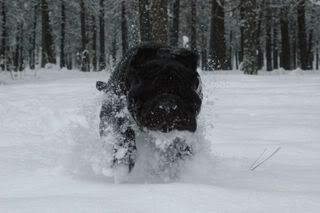I wanted to start a thread for this discussion on vit c/ascorbic acid.
From another thread, seen here:
http://www.leerburg.com/forums/ubbthreads.php/ubb/showflat/Number/181555/page/0/fpart/5
Addressing amounts/my thoughts on Vit C/ascorbic acid:
Re: dosage:
It depends on the dog and the situation. I give a regular dose of roughly 100-150 mg 3 days a week for an adult dog in 'working condition' (that is being worked physically, mentally and encounters stressful situations both physically and mentally.)
In times of greater stress, increased physical excursion or with puppies during growth spurts I will give 250 mg every other day(4 days/week) but this is when on a raw diet. When kibble fed, because some kibbles include vit c in the food I will generally only give about 50-100mg 2-3 times a week and this is for a large dog at least 65 pounds or a large breed pup over 4 months or 30 pounds. It isn't an exact science and I really don't know exactly where I get my amounts from but I do have a pill cutter for
when I get the pill form of ester c/ascorbic acid and a digital scale for weighing the amounts.
As I have understood it natural vitamine C production varies dog to dog and is one of those vitamins that is difficult to really overdose unless you give insane amounts for an extended period of time, like 1000mg a day for a small breed dog (under 25 pounds) I think I read somewhere that dogs, on average, produce about 40 mg per kg of bodyweight but this can vary if the dog has a compromised system and who knows all of the effects of poor breeding practices, illness, and various other outside factors.
I know that vit C is required for the production of proline and lysine, and collagen. I try to tailor the amount to what is happening at the time in the dogs life and I keep a careful eye on the vitamin and mineral levels of various things I give my dogs.
I have been looking into a join supplement that a breeder turned me towards called Prevention (http://www.preventionfordogs.com/Ingredients.htm) but regarding supplements I think for me the main thing is that when kibble fed to watch for overdoses when giving supplements like Prevention that have multiple ingredients.
>>>...<<<
To address the above part in bold. I don't usually give the pill form as I have a very hard time finding ester c or vit c pills that do not contain calcium or other ingredients that are not my goal to feed.
I give a 100% ascorbic acid powder - a little goes a very long way and doesn't cost much when compared to pill forms of human grade ester C (which also contain the extra ingredients I try to stay away from)
Also, pill forms vary in how much vit c/asorbic acid they have and to get a specific amount requires more work - cutting the pills, crushing them, and weighing them.
Here is an example of pure ascorbic acid powder(this is what I give):
http://store.allhealthtrends.com/pgi-productspec?NB-0200
Lysine: "Lysine
All species
Improves appetite and excretion of gastric juice, promotes the growth of young animals, especially bones, and optimises nitrogen balance in tissues
Protects from anaemia and hypo proteinosis
Helps the body absorb and conserve calcium, and helps in development of collagen and ossification
Aids in the production of antibodies, hormones & enzymes
Stimulates cell division.
Utilised in synthesis of carnitine"
From:
http://www.ranvet.com.au/amino_acids.htm
and here is a site I referrence more than I should haha.. boredome drives me to seek knowledge. Zoom in, then scroll down you will see the highlighted words of "ascorbic acid" and read there. I can't copy and paste, it won't let me. Lots of info there, great stuff
 http://books.google.com/books?id=aqeCwxbRWvsC&pg=PA234&dq=dogs+acid+proline+ascorbic+acid&ei=ORy9R-G7GoeQjgGi3LDZBQ&sig=wbE-10qvZIynMRhulqvGPICeQYk#PPA234,M1
http://books.google.com/books?id=aqeCwxbRWvsC&pg=PA234&dq=dogs+acid+proline+ascorbic+acid&ei=ORy9R-G7GoeQjgGi3LDZBQ&sig=wbE-10qvZIynMRhulqvGPICeQYk#PPA234,M1
It basically points out what effects and processes Ascorbic Acid has on the body, what defficiencies cause and what overdoses cause. This is why I am careful with the dosage and that amounts of over 100 mg are not given too often. Anytime I do increase dosage to meet stress or physical injury etc it is not for an extended period of time and is intended as a boost to the immune system.
I think any supplements should be tailored to the individual dog with emphasis on not overdoing anything. It is my personal belief that while dogs do/are supposed to produce their own supply of ascorbic acid that it can be affected by outside factors such as environmental stres, physical exertion, and that a lack of ascorbic acid production can be inherited.
I AM NOT A VET! Nor a scientist, biologist or chemist so this is just the information and protocol I follow with my own pets and any supplement should be looked at for pros and cons and proper dosage amounts before being fed to your pets.
Regarding bladder stones/crystals:
I've had vets recommend vit c to cats to prevent crystals(struvite) after urinalysis. This would be after confirming there was no bacterial infection. Vit c acidifies the urine which helps with struvite crystals, its the calcium oxalate buggers that will get you but there are more factors than just vit c.
I know generic and human forms of vit c and ester C contain calcium, which is the main concern when looking into calcium oxalate crystals. Suppliments given need to be tailored to the individual animal based on what they are fed and what is going on at the time. The calcium content is also what makes me only consider Prevention. I have to do more looking into it.
The magnesium, phosphorous/phosphates, calcium, and ash levels need to be watched, most especially if you give suppliments.
Crystals:
(
http://www.veterinarypartner.com/Content.plx?P=A&A=1741 )
"In older times (20 years or so ago), cats virtually never developed calcium oxalate bladder stones. Cat bladder stones could reliably be assumed to be made of struvite (a matrix of ammonium-magnesium-phosphate). In those days, feline lower urinary tract symptoms were generally caused by struvite crystals in urine (or at least this was the assumption). Also in those days, feline lower urinary tract symptoms were extremely common. The pet food industry responded by acidifying cat foods to prevent the development of crystals. In a way it worked. Feline lower urinary tract symptoms declined. Male cats with struvite urinary blockages became far less common. The trade off was that calcium oxalate bladder stones began to develop. Acidifying the body leads to an acid urine pH and more calcium loss into the urine, both factors in the development of a calcium oxalate stone. Currently most bladder stones formed by cats are calcium oxalate stones."
and for dogs:
(
http://www.b-naturals.com/newsletter/bladder-stones-crystals/ )
"Alkaline pH and struvite crystals are not caused by a diet of alkaline foods; they are usually caused by bladder infections. Therefore, trying to make the urine more acidic will not get rid of the infection. Alkaline pH can also be normal, as pH can vary a great deal even in the same dog at different times of the day, and also by the way the urine was captured and handled before testing.
If your dog has struvite bladder stones, then acidifying the diet, along with treating the infection, can help dissolve the stones. Ascorbic acid (a form of vitamin C), and distilled water can help with this. , Acidic foods include chicken, beef, eggs, fish, pork, cottage cheese, yogurt, rice (brown and white), beans, nuts and all seafood. "
....
calcium/oxalate:
"Calcium Oxalate crystals can also be found in a healthy dog, but are more prone to develop into stones in some dogs. The pH in dogs with these types of crystals is usually acidic or neutral. It is thought that some dogs that are more prone to these types of stones have an inherited weakness that prevents them from forming nephrocalein, which prevents calcium oxalate stone formation. While these stones are mostly treated by surgically removing them, there has been some success with reducing the oxalate rich foods in the diet and working to alkalize the urine pH.
Alkalizing foods include apples, bananas, cabbage, broccoli, beans, potatoes, pumpkin, millet, honey, alfalfa, non-distilled vinegar (organic apple cider vinegar), squash and most fruit and most vegetables.
High oxalate foods to avoid include beet greens, rhubarb, spinach, beets, raw endive, dandelion greens, okra, kale and sweet potatoes. "
Regarding nephrocalcin I have read and heard in several places that the lack or under production of it is seen in every case of calcium oxalate stones. An animal being susceptible to these stones is said to often be a hereditary problem and mostly affects male dogs. It is said that adding B vitamins.. B6 more specifically I think will help decrease oxalate formation. But I'm not sure on that. You will notice I put 'it is said' a lot and that is because I personally have no proof one way or another, not being a vet.
I'm sure if I have forgotten anything someone will add some more info or correct me if I am wrong. Actually.. PLEASE correct me if I am wrong!

Hope this is in any way helpful

Jenn
Edited by Jennifer Marshal (02/21/2008 12:58 AM)
Edit reason: wowie typos!!
 Previous Topic
Previous Topic Index
Index Next Topic
Next Topic














 Top
Top

.jpg)


